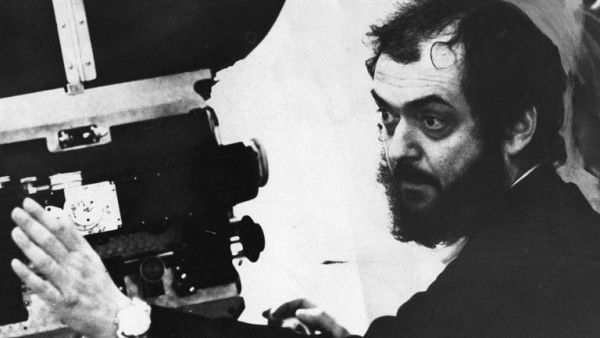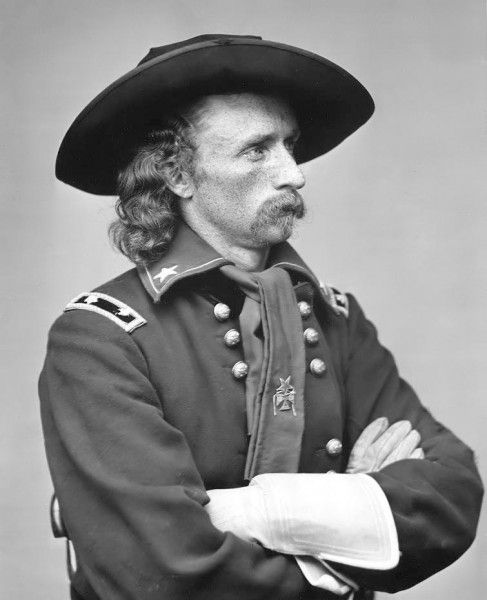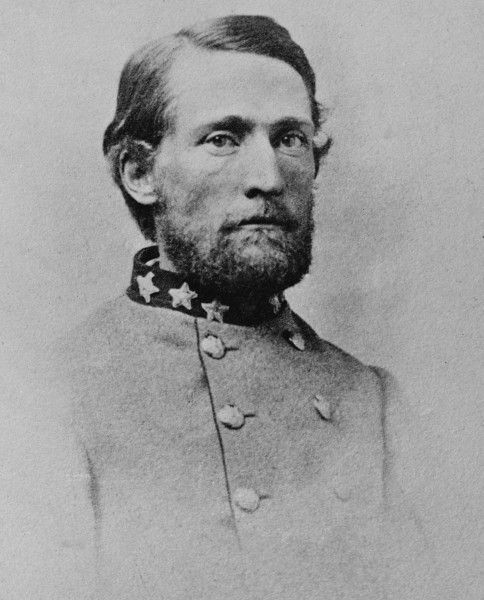Stanley Kubrick lives on, not only in his classic movies, but also in his unproduced screenplay, The Downslope. The movie is now being developed into a trilogy of “sweeping, period action-dramas based on historical events,” specifically, the Civil War. The movie, which Kubrick wrote between Fear and Desire and Paths of Glory, “focuses on a bitter, strategic series of Civil War battles in the Shenandoah Valley between Union General George Armstrong Custer and Confederate Colonel John Singleton Mosby, known as the Gray Ghost for his stealth and elusiveness. His cavalrymen, known as Mosby’s Rangers, continually outsmarted the much larger enemy forces in a sequence of raids, which enraged Custer and eventually created a fierce cycle of revenge between the two men.”
When paired with Kubrick’s vigorous research, (the movie “was developed with renowned Civil War historian Shelby Foote, Kubrick’s story is based on historical events. Deeply passionate about the time period, Kubrick spent years studying, developing and writing the story, and creating maps and notes as to how he planned to shoot the movie.”), it’s a shame that he never got to direct what would could have been an exciting addition to his filmography.
Although the project has Kubrick’s blessing, my excitement becomes diminished when it’s being stretched out into a trilogy, and Marc Forster is developing the project to direct and produce the first installment. There are maybe two or three directors who could perhaps channel the cold, exacting, sorrowful work (David Fincher and Mark Romanek are the ones who come to mind). Forster, on the other hand, had World War Z spiraling into a disaster, and his previous movies aren’t good either. Forster’s the kind of director who has a kid die on screen and then feels the need to have the music soar so that you know the scene is supposed to be sad (this happens in Machine Gun Preacher).
I’m conflicted about whether I want any of Kubrick’s work to be adapted. A.I. Artificial Intelligence is a unique partnership with Steven Spielberg that yielded a fascinating albeit flawed result. Like I said, there are only a few directors who could conceivably channel Kubrick, and I don’t think Forster is one of them. Kubrick was an artist, not a brand, and slapping his name on something doesn’t make it a “A Stanley Kubrick Film’.
Here's the full press release:
STANLEY KUBRICK’S ORIGINAL SCREENPLAY ‘THE DOWNSLOPE’
BEING DEVELOPED AS A TRILOGY OF FEATURE FILMS
The Sweeping, Period Action-Drama Based on Historical
Events Is Being Developed For Marc Forster To Direct
LOS ANGELES, CA, JUNE 22, 2015 – An original screenplay written in 1956 by the late filmmaker Stanley Kubrick is being developed as a feature trilogy with Marc Forster (“Finding Neverland,” “Monsters Ball,” “World War Z”) attached to direct and produce the first in the series. He will also produce the subsequent features.
Producers Lauren Selig (“Lone Survivor,” “Black Mass,” upcoming “Everest), Barry Levine (“Hercules,” “Oblivion”) and Reneé Wolfe (upcoming “All I See Is You”) are developing the material with Forster. Selig initiated the project with producers/rights holders Phil Hobbs (“Full Metal Jacket”) and Steve Lanning, who are also serving as producers on the project. The project has the full support and encouragement of the Kubrick family.
THE DOWNSLOPE is a sweeping, historical action-drama Kubrick wrote following the release of his allegorical war film “Fear and Desire,” and prior to directing his seminal WW I period piece, “Paths of Glory,” and like both, THE DOWNSLOPE is a cautionary, anti-war tale.
THE DOWNSLOPE focuses on a bitter, strategic series of Civil War battles in the Shenandoah Valley between Union General George Armstrong Custer and Confederate Colonel John Singleton Mosby, known as the Gray Ghost for his stealth and elusiveness. His cavalrymen, known as Mosby’s Rangers, continually outsmarted the much larger enemy forces in a sequence of raids, which enraged Custer and eventually created a fierce cycle of revenge between the two men.
Originally developed with renowned Civil War historian Shelby Foote, Kubrick’s story is based on historical events. Deeply passionate about the time period, Kubrick spent years studying, developing and writing the story, and creating maps and notes as to how he planned to shoot the movie.
States Lauren Selig: “We've been given the unique privilege to produce a Stanley Kubrick script no one has had the opportunity to make. The first installment of the planned trilogy, written by Kubrick, is an engrossing story illustrating a crucial moment in history toward the end of the American Civil War.”
The succeeding stories will expand upon Kubrick’s original story and journey west, as post-war Americans settled the new frontier, delivering on the country’s unbending ambitions and dreams of Manifest Destiny.
Hobbs and Lanning stated: “A Stanley Kubrick script deserves a singular director, especially one so gifted working with talented actors. We are thrilled to be collaborating with Marc on this very unique and special project.”
About Kubrick, Forster states: “I am indebted to Stanley Kubrick and his visionary films. It is an honor and a huge responsibility to take on this project, and we’re thankful to his family for their support. This is a powerful work, an epic story, with its psychological landscape of brother pitted against brother, and friend against friend. We believe it will be an incredibly interesting trilogy, and a great experience sharing our mutual passion of Kubrick's vision."
Adds Renee Wolfe: "I had the rare opportunity to pour over Stanley Kubrick's handwritten notes on this script, which consist of literally hundreds of meticulous and beautifully drawn maps, sketches and journal entries. The level of passion and insight that he had for this intense period of American history is both inspiring and astounding."
Marc Forster has directed major studio films (“Quantum of Solace,” “World War Z,” “Stranger Than Fiction”) and independent character driven films (Oscar Best Picture nominee “Finding Neverland,” Oscar winning “Monsters Ball, ” “The Kite Runner”). He is currently directing his screenplay of “All I See Is You,” developed and produced with producing partner Reneé Wolfe via their creative company, 2Dux2. “All I See Is You” is a visually driven drama that tells the story of a blind woman (Blake Lively) and her husband (Jason Clarke) who, upon the restoration of her sight, begin to discover previously unseen and disturbing details about themselves, their marriage and their lives.
Stanley Kubrick, who was Oscar-nominated four times for directing and five for writing, wrote and directed some of cinema’s most memorable and controversial films, including “Spartacus,” “Lolita,” “Dr. Strangelove,” “2001: A Space Odyssey,” “A Clockwork Orange,” “Barry Lyndon,” and “The Shining,” among many others. A number of his films, such as the aforementioned “Paths of Glory,” in addition to his “Full Metal Jacket,” dealt with the atrocities of war, and their impact on individuals and societies.




